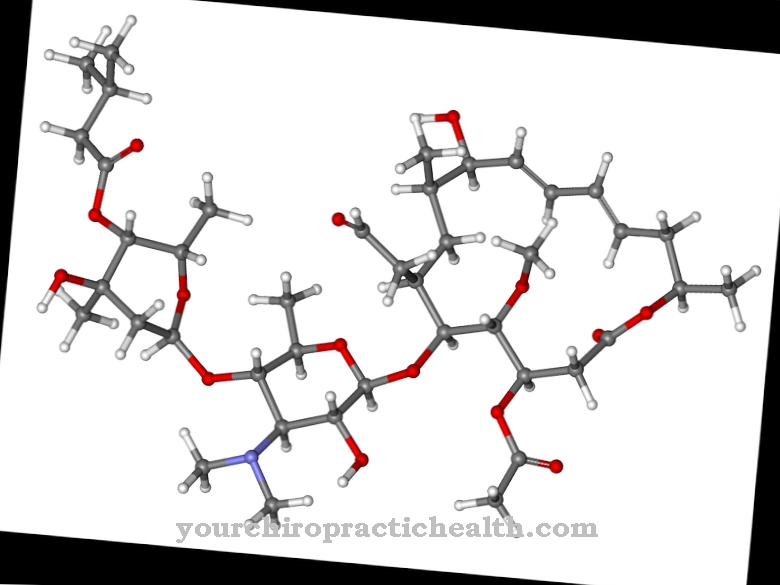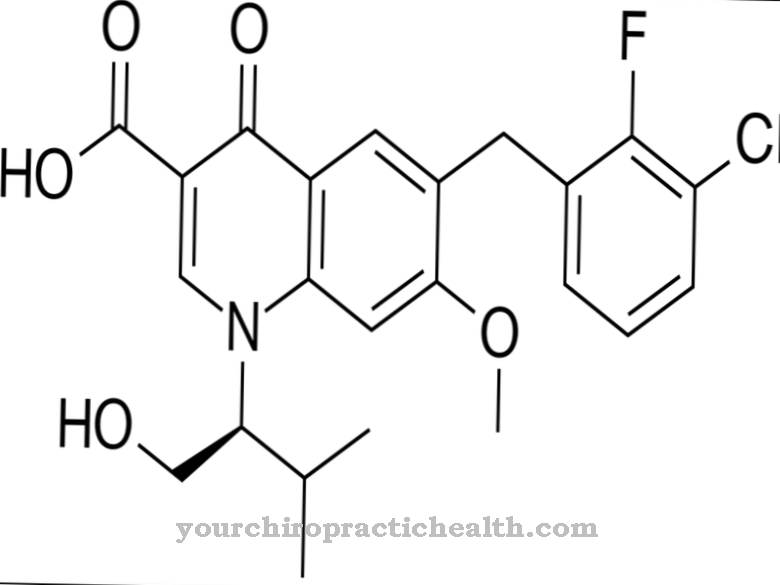At Pentetrazole is a medicinal substance that has a stimulating effect on the patient's circulation. Pentetrazole is a bicyclic derivative of tetrazole. The key effect of the drug pentetrazole is that it stimulates the areas in the brain that are responsible for breathing and the activity of the heart. When people receive the drug in high doses, they usually experience convulsions. For this reason, pentetrazole was previously used in shock therapy.
What is pentetrazole?
Basically, pentetrazole belongs to the group of medicinal substances called convulsants. The drug is also under the names Pentylenetetrazole, Leptazole and Metrazole known. The molar mass of the substance is approximately 138. At room temperature, pentetrazole is in a solid state.
The substance pentetrazole is characterized by a pungent odor and a bitter taste. Pentetrazole mostly appears in the form of crystals. The substance's melting temperature is between 57 and 60 degrees Celsius. In addition, pentetrazole dissolves relatively well in water and in numerous other organic solutions.
The active ingredient pentetrazole has a comparatively high stability and is relatively resistant to attack by other chemical substances. Basically, pentetrazole is formed through a special chemical reaction in which cyclohexanone and hydrazoic acid react with one another. The chemist Karl-Friedrich Schmidt discovered the substance, which was subsequently used by numerous other researchers and doctors in the medical field.
One of the effects of pentetrazole is that it causes cramps in the patient. That is why doctors use the drug in shock therapy, for example. At the present time, pentetrazole is no longer available as a drug on the pharmaceutical market in many countries. This is primarily due to serious complications and side effects that have resulted in death in some people. In 1982, the US Food and Drug Administration banned the use of pentetrazole in humans.
Pharmacological effect on the body and organs
Pentetrazole is one of those convulsants that act in particular on the brain stem. Pentetrazole is also an analeptic and stimulates the brain centers that control circulation and breathing. The agent mainly activates certain neurons and is able to trigger epilepsy-like seizures. These convulsions can only be differentiated from real epilepsy by means of an electroencephalogram.
In earlier times, the drug pentetrazole was used, for example, as an antidote for poisoning or overdose with certain sleeping pills, the so-called barbiturates. However, pentetrazole sometimes causes serious complications, some of which are fatal. For example, after taking pentetrazole, some people experience convulsions and associated hypoxia that sometimes leads to death.
Medical application & use for treatment & prevention
The medicinal substance pentetrazole is used both as an analeptic and as a convulsive of the brain stem. Pentetrazole particularly stimulates the neurons of certain areas of the brain. Since pentetrazole mainly affects those areas that control breathing and circulation, the effects of the drug also unfold on the heart.
Occasionally, pentetrazole causes seizures, which are difficult to distinguish from classic epilepsy. However, this is an undesirable effect of the drug. In the past, pentetrazole was mainly used as an antidote for poisoning with barbitures. Pentetrazole was also a popular circulatory stimulant. In addition, doctors used pentetrazole in shock therapy and made use of its convulsive effect.
However, due to the complications and side effects of pentetrazole, the active ingredient is no longer available in many countries. Today, pentetrazole is mainly used in animal experiments. Researchers use pentetrazole, for example, to trigger convulsions.
Risks & side effects
The intake of the active ingredient pentetrazole leads to considerable side effects and complications in some patients, which is why it has now lost approval as a drug in many countries. For one thing, in some cases pentetrazole causes general digestive tract complaints such as nausea and vomiting. On the other hand, pentetrazole sometimes triggers epilepsy-like convulsions. The risk of cramps increases with the dosage.
These convulsions result in hypoxia in some people, which in many cases is fatal. For this reason in particular, pentetrazole is hardly used as a drug in human medicine today.
Hypoxia is a life-threatening condition in which the organism or certain areas of the body are no longer adequately supplied with oxygen. Patients panic with tachycardia and cyanosis. If they fail to receive therapy, people lose consciousness, fall into a coma, or suffer cardiac arrest.
In addition, certain interactions with other medicinal substances must be considered before taking pentetrazole. For example, if patients take pentetrazole at the same time as the drug haloperidol, the risk of seizures increases. If it is necessary to administer both drugs at the same time, the person must be strictly monitored by a doctor.












.jpg)



.jpg)










.jpg)
